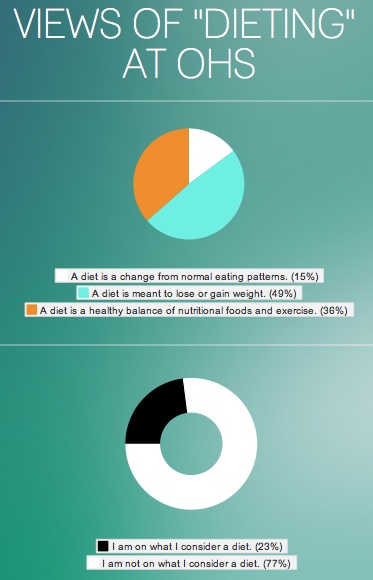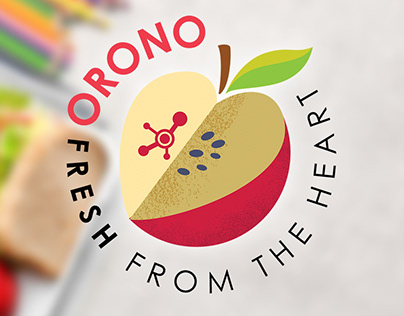Organic and gluten-free “health diets” rise

Student opinions on the definition of a diet and if they believe that they are on one.
“Dieting is good if it’s a health diet, but bad when used for the wrong reasons,” senior Miranda Mosher said. Mosher is on a gluten-free diet because the gluten and MSG in modern processed foods give her severe migraines.
Weight-loss diets have always had a bad reputation. “I think they’re ineffective,” senior Mckenna Eckerline said. She has been on a vegetarian diet for six-plus years.
According to Natural News, weight-loss diets are ineffective because weight-loss diets are temporary and the body will revert back to its old patterns if the diet has not been instilled long enough.
“Regrettably, people who use fad diets usually end up gaining back any weight lost and many times, gain even more weight. Furthermore, recent research indicates this repeated “yo-yo” dieting may actually reduce one’s lifespan,” according to Natural News.
Yet, with all of the dieting fads out there and increasing awareness of their dangers, dieting in America has seemingly increased not just because of its ongoing obesity problem.
“I think all of this processed food builds up in our systems over time. Our bodies are just now starting to reject those foods more and more,” Mosher said.
“I think it’s the Internet. We have more information on what is in our food,” OHS health clerk Ann Turner said.
A study done at the Mayo Clinic suggests it’s both. In the 1950s, there were less than four times the number of people diagnosed with celiac disease.
Celiac disease damages the small intestine when it comes into contact with gluten in wheat, barley, rye and some oats. This prevents nutrient absorption.
The number of celiac diagnoses are increasing, beginning with the twentieth century Green Revolution, which cross-bred wheat so that it could grow in less accommodating conditions. Now, processed foods, hormones and pesticides also play a role in people’s food sensitivities, such as gluten, lactose, glucose and more.
An article from CBS News supports the idea that gluten-free dieters are not just people with celiac, “. . . most people with celiac disease might not be aware they have the condition, and many people eating gluten-free diets have never been diagnosed with celiac disease.”
However, even though the numbers of people on a gluten-free diet for celiac disease and other autoimmune diseases are increasing (along with the supposed population of 18 million gluten-sensitive people) who are not diagnosed are also going on the diet.
So perhaps it is both awareness and our bodies that are causing the health diets’ extreme rise in popularity.
Turner said that dehydration is the most common theme among students, but she has also noticed the rise in health dieting. And not just gluten-free.
Turner said that people are becoming more and more aware of what they’re putting into their bodies and have been surprised by how a healthy digestive tract can help fight illnesses and support things like strong nails and clear skin.
The digestive system is interconnected with all other bodily systems, especially the immune system, which is what fights off illness.
The digestive tract breaks down and absorbs nutrients and eliminates waste. Eating foods that promote the immune system or certain organs such as the liver or pancreas can be helpful to the overall health of the body.
According to Cancer.org, “whether organic foods carry a lower risk of cancer because they are less likely to be contaminated by compounds that might cause cancer is largely unknown.”
The organization also says that organic foods sometimes have higher nutrient levels and are without pesticides, herbicides, antibiotics and hormones, which are also being studied as possible indicators to higher cancer risks.
However, according to Fox News, turning to organic and gluten-free foods is not always an easy change when it comes to price differences. Organic food can cost anywhere from 20-100 percent more than conventional food.
Organic in relation to food is a term owned by USDA. According to the Mayo Clinic, “Organic farming practices are designed to encourage soil and water conservation and reduce pollution. Farmers who grow organic produce and meat don’t use conventional methods to fertilize, control weeds or prevent livestock disease.”
Harvest Moon manager David Giedd said the rise in organic food has been growing for at least twenty years. “It is the only part of the grocery world that is expanding,” Giedd said.
“I cannot express how much easier it’s gotten,” senior Kara Gardiner said. She has been on a gluten-free diet for celiac disease since she was three years old.
“Five years ago no one knew what gluten-free was,” Gardiner said.
Unlike most dieting fads that eventually die out, Giedd doesn’t see this trend plateauing as more and more people are educated about the links between today’s conventional foods and overall health. He also said he believes that as the demand for organic and gluten-free foods increase, the prices should decrease.
Whether people have begun to choose health dieting because of increased food sensitivities, diseases, cancer or awareness about the environment, it is only clear that this population of ‘dieters’ is rising and it doesn’t look to be slowing down anytime soon.

When you walk into the local Wayzata bookstore The Bookcase, you’ll often chance upon Orono senior and Newspaper necessity, Rachel Bongart.
Bongart...










